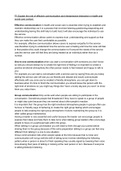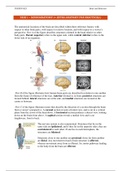‘Kantian ethics is the most helpful in making moral decisions.’ Discuss.
Paragraph 1
P -Kant argues that we must perform our duty.
E -Duty is our universal moral code, meaning everyone must follow their duty. Duty must be
performed out of good will, performing the right action for the right reason. Duty cannot be
performed out of self-interest, for example a shopkeeper Who charges customers fairly just because
he figures it is good for business is not performing out of duty. Because duty is universal, all humans
have the same duties which they are able to work out since they are human, these can be worked
out using reason.
R - However, Kants theory of duty relies heavily on the basis that all humans are capable of thinking
rationally to come to a reasonable moral decision. This is not the case as not all humans will be
capable of using their reason to understand their duty, meaning this theory is not good for making
moral decisions.
Paragraph 2
P –Kantian ethics is helpful due to the categorical imperative.
E – One aspect of the categorical imperative is the formula of the end in itself. This formula suggests
that everyone is rational and autonomous meaning that everyone has a duty to treat people as ends
in themselves not as a means to an end. This means that no one should be used for someone's own
benefit. Because of this Kant rules out all forms of human exploitation as it removes the individuals
free will and implies that they are being used for personal benefit.
R - This view can be criticised as it does not regard the situation of the action, making it unhelpful in
practice. There may be a situation where an individual may have to use someone for their own
benefit to survive.
Paragraph 3
P – Kantian ethics is not the most helpful.
E – Bentham would argue that the best way to make a moral decision is by weighing up the amount
of pleasure and pain which is likely to result from the outcome of a particular action in a particular
circumstance. This suggests that the same action performed in two separate circumstances may be
regarded differently in terms of how moral the action was. In the example of stealing, there will be
greater happiness, or pleasure, produce if a loaf of bread is stolen to feed starving children, than if a
pair of shoes are stolen just because you wanted them.
R - Kant argues that the same action should be conducted in the same way, regardless of any
consequences, by everyone partaking in the action.
‘Excluding empathy from moral decision making is wrong’ Discuss.
Paragraph 1



